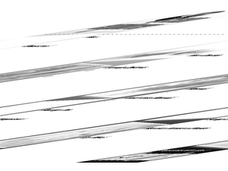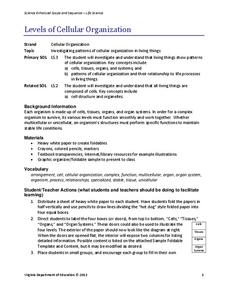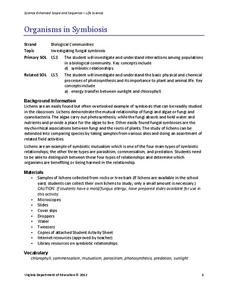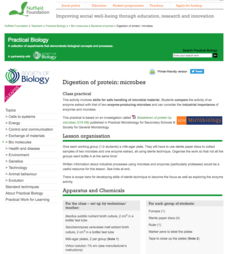Centers for Disease Control and Prevention
Learning about Giardia and Giardiasis - Research and Role Play
Young biologists begin researching giardia and completing an epidemiologic triangle. They then portray either a parent of a sick child or a physician in a fun role play activity.
Curated OER
Anchialine Cave Species
Ever heard of a stygofauna or a stygobite? How about an anchialine cave? Set your young biologists on a quest to find information about organisms that live in and have adapted to life in caves located near the water. Class members then...
Curated OER
Introduction to Bacteria
Beginning biologists survey several websites to learn about the types, structure, motility, feeding habits, and reproductive methods of bacteria. All websites are linked to the lesson plan, so you can have individuals access it and click...
Teach Engineering
How Antibiotics Work
Take two pills and call me in the morning. The first lesson plan in a short unit of four introduces class members to delivery methods of medicines. The instruction introduces the question of which delivery method is best to get you...
WindWise Education
Can We Reduce Risk to Bats?
It is just batty! A resource outlines a case study scenario of reducing the risk to bats. Teams learn about the bat populations in the area of the wind farm, then research and propose a solution.
NASA
Biology Training Module
Are you a koalafied biologist? The lesson begins with research about human survival and our ecosystem. Then, an online training module simulates the effects of changes to the plants and animals in an ecosystem. Finally, scholars research...
Curated OER
Designing Tools for Ocean Exploration
Students explore the complexity of ocean exploration and the technological applications and capabilities required for ocean exploration. They consider the importance of teamwork in scientific research projects.
Curated OER
Maine Black Bear Research and Field Study Activity
Students participate in a field study of Maine Black Bears. They first do academic research on the Maine Black Bear. Following extensive research and discussion, students go out into the field with Maine State Biologist to observe bears...
ARKive
Biodiversity and Evolution – Darwin’s Finches
Teens experience natural selection firsthand (or first beak) in an activity that has them act as finches foraging for food. Using different household items to act as different beak styles, your little finches will collect as much food...
Baylor College
Defending Against Microbes
In the preceding lesson from the unit, beginning biologists discovered that microorganisms are everywhere, so the question follows, why are we not sick all of the time? Class members read and discuss an article in small groups about...
Virginia Department of Education
Levels of Cellular Organization
What an eccentric way to learn about each level of cellular organization! Allow emerging biologists to utilize white paper and create their own foldable charts to describe each level of organization in the body. You may also adapt the...
NOAA
Seafood and Human Health
Whether your young biologists realize it or not, humans play a significant role in marine ecosystems. To help them understand this fact children first create graphical representations that show homo sapiens' place in marine food chains,...
Virginia Department of Education
Radioactive Decay and Half-Life
Explain the importance of radioactive half-life as your high school biologists demonstrate the concept by performing a series of steps designed to simulate radioactive decay. Pupils use pennies to perform an experiment and gather data....
Howard Hughes Medical Institute
Lesson 3: Scientific Inquiry with WildCam Gorongosa
When biologists installed cameras in Gorongosa National Park, they ended up viewing a lot more than the lions they were trying to help! Young ecologists observe one of Africa's most beautiful savanna regions with interactive trail camera...
NOAA
Understanding Food Chains and Food Webs
Jump into an exploration of marine ecosystems with the first lesson in this four-part series. After first learning about crustaceans, mollusks, and other forms of sea life, young marine biologists view a PowerPoint presentation that...
Virginia Department of Education
Organisms in Symbiosis
Searching for an activity that allows emerging biologists to explore symbiosis up close and personal? Pupils collect samples and view lichens through a microscope and conclude with a discussion about the relationship they have with other...
Virginia Department of Education
The Germ Theory and Koch’s Postulates
Explore the history of cholera and its effect on society with your biology class. Young biologists will then proceed to grow their own germs, prepared from live cultures, and follow the steps of the scientific method to generate data....
Nuffield Foundation
Digestion of Protein: Microbes
Milk the resource for all it's worth. Young biologists perform assay techniques to test the digestion of protein. They place bacterial samples, fungal samples, trypsin solution, and distilled water on a milk-agar plate to see the effects...
Smithsonian Institution
Trait Tracker
Help mice beat the odds with an exciting activity about traits. Biologists discover the role of diet and other factors on animal traits by participating in a simulation activity. Teams collect and evaluate data to understand how certain...
Curated OER
Biology Biographies
Students create a project about a famous Biologist in order to appreciate the humanity of the people involved in doing science. They create scientist biography "cards" roughly modeled after baseball cards or create a scrapbook of a...
Curated OER
Internet Field Trip: Simple Machines
Students research simple machines. In this physics lesson, students participate in a WebQuest to gain knowledge about simple machines. WebQuest activities and worksheets are included in this lesson.
Howard Hughes Medical Institute
Survival of the Fittest - Variations in the Clam Species Clamys sweetus
It's not often that you come across a clever laboratory activity that is both imaginative and comprehensive! Using M&M's and Reese's peanut butter candies to represent two different clam species, young biologists test for "relative...
Desert Discoveries
Keepers of the Prairie
Young ecologists examine the case of the prairie dog, and their near extinction. They read a terrific student handout embedded in the plan, and engage in a class discussion that's based on what they read. Learners perform research on...
Field Museum
The Case of Darwin's Finches
One of the most striking pieces of evidence for Darwin's Evolution of Species was his observations of finches and how their beaks differed from island to island, depending on their primary food sources. So what would happen to the theory...

























